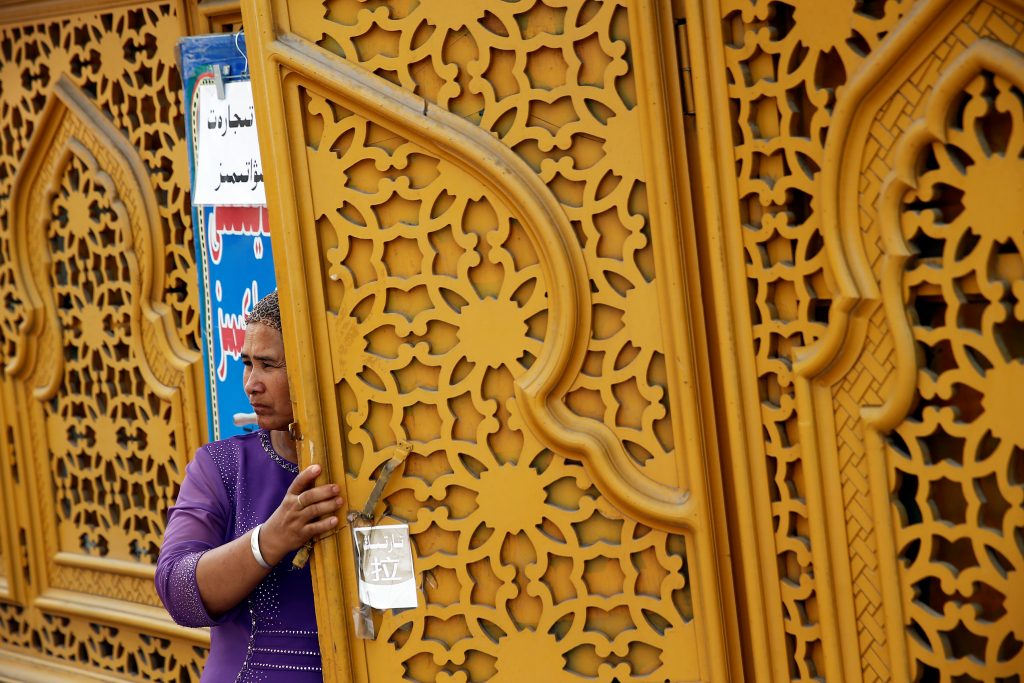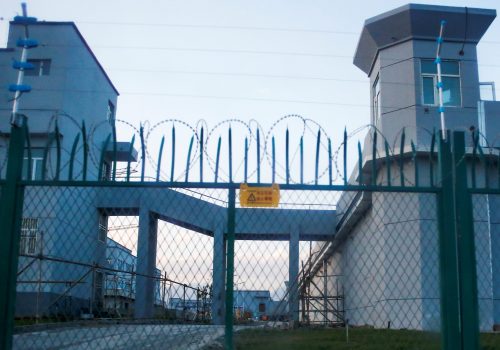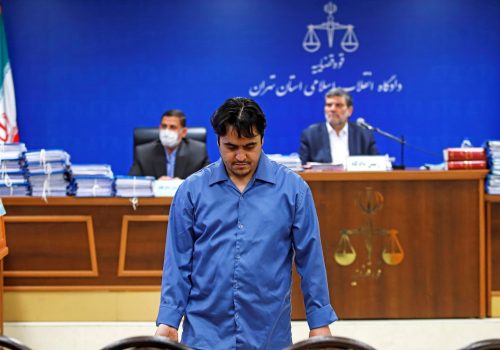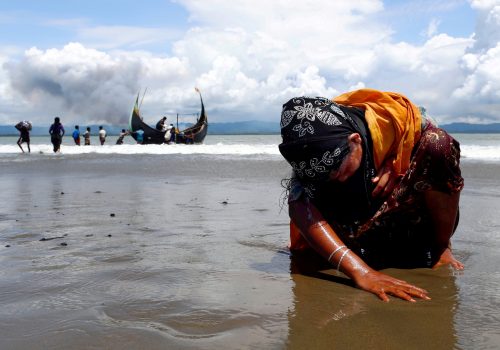This piece was updated on December 22, 2021.
Although slavery is widely believed to be a thing of the past, in reality it never ended—and still thrives in countries like China, where many of the at least one million ethnic Uyghurs who have disappeared into internment camps are toiling away in forced-labor factories. In addition, many are given lengthy sentences based on trumped-up charges without any legal process. Their suffering is exported far beyond China’s borders through global supply chains, away from the prying eyes of the consumer.
My brother, Ekpar Asat, is one of those forced into concentration camps. Ekpar is a model citizen, renowned Uyghur tech entrepreneur, philanthropist, and an alumnus of the State Department’s prestigious International Visitor Leadership Program. Before his disappearance, Chinese media described him as a bright star in the tech world and a positive force for humanity. That was all before 2016, when China began criminalizing the Uyghur identity, culture, and race. Ekpar is now believed to be in solitary confinement.
As his sister and a former Wall Street lawyer, I’m disheartened by the immoral leadership of some Western corporations claiming to be champions of ethical business models while hiding their illicit practices beyond scrutiny in an authoritarian country. Credible evidence suggests that Western brands in a wide range of sectors are complicit in utilizing Uyghur forced labor in their supply chains.
They virtue-signal with superficial statements—claiming human rights are core to their values—only when it advances the bottom line, and they have no problem sharing contradictory messages depending on the domestic audience. American companies took a stance against Georgia’s controversial voting laws, with Major League Baseball removing its All-Star Game from Atlanta—but they refused to do the same against China’s 2022 Winter Olympics. In fact, leaders of American companies co-sponsoring the Olympics all refused to utter a word about China’s egregious rights abuses when questioned during a recent congressional hearing.
These companies seem unbothered about the future they’re helping to build, one in which slavery is acceptable as long as it’s kept quiet. But that could soon change.
Following unanimous approval by the US Senate last week, the Uyghur Forced Labor Prevention Act is now awaiting President Joe Biden’s signature in the coming days. By banning goods produced with forced labor from the American market, it sends a clear message that such abuse has no place in American and international supply chains—and deals a major blow to the business giants that lobbied against it, including Apple, Coca-Cola, and Nike.
This is a unique opportunity for the United States to create and lead a human-rights regime to take on modern slavery. It must not pass it up.
The time is now
The bill would significantly constrain unacceptable corporate behavior—not to mention safeguard consumer consciousness—by bringing lasting ethical improvement to global industry. The law would also influence other powerful democratic actors such as the European Union (EU) to pass similar laws imposing serious costs on Beijing to improve its labor practices and end the crimes against humanity.
But no matter how beautifully the law has been written, enforcement is key. The responsible agencies must channel the Department of Justice’s approach to executing the Foreign Corrupt Practices Act (FCPA) to create an aggressive enforcement regime and incentivize companies to voluntarily disclose wrongdoing in their supply chains in a timely manner. Officials from the State Department, Securities and Exchange Commission, and elsewhere must be extra vigilant, since Chinese companies can redesign their supply chain to evade the law’s purview. For example, the Xinjiang Production and Construction Corps, sanctioned by both the United States and the EU, allegedly “remains globally integrated through trade, foreign subsidiaries, and publicly listed companies,” according to a recent investigation by nonprofit C4ADS.
For their part, Western corporations can set ethical standards for Chinese companies to follow to prevent human trafficking and modern-day slavery. Companies could also face legal action—such as the criminal complaint filed against Nike and Patagonia, among others—if they fail to uphold the standards.
But global firms that have already spoken out have suffered blowback. Swedish retailer H&M responded positively (albeit belatedly) to the worldwide call to cease sourcing products from Xinjiang—the northwestern, predominantly Uyghur province known for its cotton. But several months later, the company was attacked in a jingoistic online campaign orchestrated by the Chinese Communist Youth League, a state-affiliated entity. H&M then disappeared from Chinese mapping, e-commerce, ride-hailing, and discount-deals apps.
Unlike with the Uyghurs, who are sentenced to camps indefinitely, the retaliation against H&M lasted only a few days. Even so, the Chinese government’s message was heard loud and clear by other companies, such as Fila and Hugo Boss, which retracted their support for anti-slavery initiatives—though Hugo Boss more recently denounced forced labor and said that it has “not procured any goods originating in the Xinjiang region from direct suppliers.” Some companies went as far as to appease China by affirming that they have always been sourcing from Xinjiang, despite the allegations of exploitative forced labor.
Since the FCPA, which was born out of bribery scandals in the mid-1970s, the United States has pioneered an aggressive anti-corruption enforcement regime to curb American companies from engaging in corrupt behaviors. Many countries, including those in Europe, have adopted FCPA-like laws and mechanisms to tackle corruption. Once again, we are seeing scandalous instances of corporate greed at the expense of the vulnerable—and the need for US leadership.
The Uyghur Forced Labor Prevention Act places the burden on American companies to prove that their products are free from forced labor. Since moral arguments have been unable to sway them for years as they plead ignorance, it’s time for the full force of the US government to step in boldly and creatively.
If Americans continue ignoring slavery and human suffering in China’s concentration camps, I’ll never be able reunite with my loving brother, role model, and best friend. Likewise, the world will be deprived of his talent, wisdom, and kindness.
For far too long, consumers, companies, and entire countries have accepted unethical behaviors committed by powerful actors and tolerated modern slavery in the interest of commercial demand. But we cannot achieve a better environment on the backs of enslaved people; this culture of impunity must end now.
Rayhan Asat is a nonresident senior fellow at the Atlantic Council’s Strategic Litigation Project and an international human-rights lawyer.
Further reading
Fri, Jul 23, 2021
A strategic framework for countering China’s human-rights violations in Xinjiang
Issue Brief By Jeffrey Cimmino
China is engaged in a systematic campaign of repression against predominantly Muslim ethnic minorities in Xinjiang Uyghur Autonomous Region (XUAR) in northwest China, and its actions call for a coordinated response on the part of the United States and its allies.
Thu, Jul 29, 2021
The US needs better tools to fight transnational repression. Here’s where to start.
New Atlanticist By Gissou Nia
As autocrats reach beyond their borders to punish their opponents, the United States must meet the challenge by preparing effective, forward-thinking policy.
Fri, Sep 17, 2021
Now is the time to recognize the genocide in Burma
New Atlanticist By
A genocide designation would present a new avenue through which to punish the Burmese military.
Image: A woman looks through open doors in the Old City in Kashgar in Xinjiang Uighur Autonomous Region, China September 6, 2018. Picture taken September 6, 2018. To match Special Report MUSLIMS-CAMPS/CHINA REUTERS/Thomas Peter



